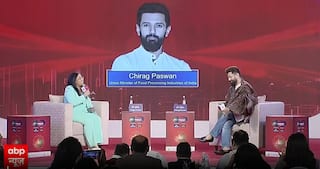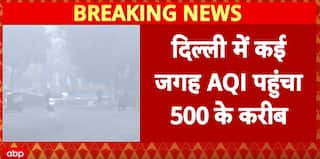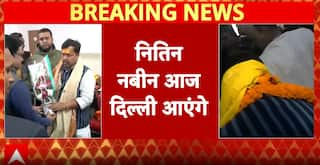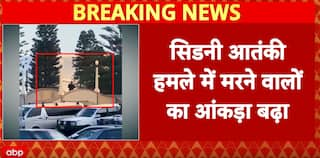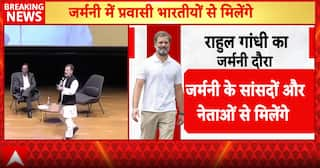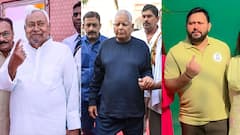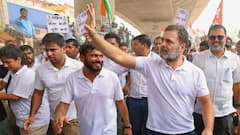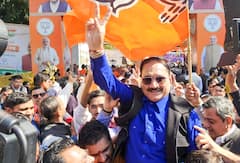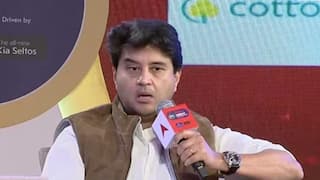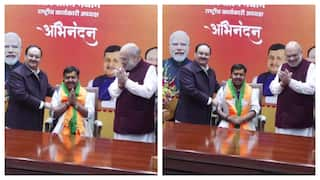From Infighting To Saini Factor: 7 Factors That Led To Congress' Setback In Haryana
Haryana Elections: While Congress, led by Bhupinder Singh Hooda, focused primarily on Jat votes, there was a counter-consolidation of non-Jat voters who voted in favour of the BJP.

The BJP is set for a historic third term in Haryana assembly elections, defying the exit polls predictions and putting the celebrations at the Congress headquarters to rest. The BJP is leading in 50 seats, comfortably crossing the halfway mark in Haryana.
The Congress, on the other hand, is ahead in 35 seats in a major upset for the party depsite having several factors in favour, including farmers' wrath, anti-incumbency, unemployment and wrestler's protest.
Here are some of the reasons why the Congress lost the state despite leading in initial trends:
Dependence On Jat Voters
The Congress depended heavily on the Jat voters, who comprise 27 per cent of the state's voters. While the Congress, led by Bhupinder Singh Hooda, focused primarily on Jat votes, there was a counter-consolidation of non-Jat voters who voted in favour of the BJP. However, the Jat community is not in the majority and is second to OBCs.
ALSO READ | Haryana Election Results: What Led To BJP's Hatrick — A Feat Achieved By No Party In The State
Apart from focusing on the OBC voters, the party also gave tickets to Brahmins, Baniyas, Punjabis/Khatris and Rajputs, dropping a significant number of sitting MLAs.
Hooda Factor
Bhupinder Singh Hooda, a four-time MP, six-time MLA and the man who could have been three-time chief minister of Haryana, hadn’t anticipate the results on Tuesday. The Congress contested 89 of the 90 Assembly seats and most of the the tickets went to Hooda loyalists or those considered close to him. Besides, the party re-fielded all 28 sitting MLAs, most of whom owe allegiance to Hooda. Senior Congress leader Kumari Selja did not contest the elections but her aspiration to be at the helm of the state was no secret. However, Hooda, who was given a free hand by the Congress leadership, failed to deliver results and won only 36 seats in state. A majority of Hooda loyalists failed to win elections.
Party Infighting
The Congress's biggest problem this election has been the factional feud between Former CM Bhupinder Singh Hooda and Sirsa Lok Sabha seat MP Kumari Selja. The tussle for the Chief Minister's position was visible in Congress between Hooda and Selja, with neither of the two willing to back down. While Bhupinder Hooda reiterated that he would lead the Congress once the party wins, Selja remained adamant. The incumbent MP from Sirsa remained absent from election rallies and was upset for being 'ignored' during the ticket distribution.
Regional Forces and Independents
While the Congress remained ahead of the BJP in terms of vote-share, but the party was not able to convert its lead into seats. The margin remained low in several seats in Haryana, indicating that smaller parties and independents banked on the Congress voter, clearing the way for the BJP.
Saini Factor
Haryana Chief Minister Nayab Singh Saini was able to display strong leadership and responsibility, keeping the anti-incumbency factor away. Saini became the chief minister at a critical point, where the BJP was facing the wrath of the farmers and the army aspirants over Agnipath scheme. Not only Saini ensured a smooth transition of powers, but also remained confident throughout the BJP's campaign, ensuring the party's victory for a historic third term. He also managed to garner public support with a focus on developmental programmes during his short tenure of seven months.
BJP's Supremacy In Urban Areas
The BJP has remained a dominant factor in the urban seats of the state, like Gurguram and Faridabad. The BJP remained victorious in urban areas like Gurgaon, Faridabad and Ballabhgarh.
Congress' Promises Didn't Find Takers
While the issues of the farmers and Agniveers didn't find an audience in Haryana, the party's guarantees for the people in Haryana didn't have many takers. The party promised subsidised gas cylinders, free electricity, legal guarantee for MSP and free treatment up to Rs 25 lakh.






